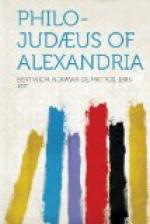The two main heads of Biblical interpretation which the Jewish religious genius developed, Peshat and Derash,—these represent two permanent attitudes of mind. In the first the commentator tries to get at the exact meaning of the text before him, to make its lesson clear and discuss the circumstances of the composition, the exact relations of its parts. He is satisfied to take the writer of the Biblical book for what he says in his own form of utterance. In the second the commentator is more anxious to inculcate ideas and lessons which do not arise obviously from the text, and to widen the significance of what he finds in the Bible. The interpretation ceases to be a mere exposition; it becomes creative or conciliating thought, and the interpreter becomes a religious reformer, a philosopher, a prophet. To this school Philo belongs, and the framework of his teaching or the ingenuity by which he develops it from his text is of small account. It is what he teaches and what he considers to be the vital things in religion and life to which we must pay attention. Judged on this ground Philo is a supreme master of Derash, and must take a place among the most creative of the interpreters of the Bible.
* * * * *
IV
PHILO AND THE TORAH
Over and over again Philo declares that his function is to expound the law of Moses. Moses was the interpreter of God’s word to Israel; and Philo aspired to be the interpreter of the revelation of Moses to the Hellenistic world, “the living voice of the holy law.” He believed that Israel was a chosen people in the sense that it had received the Divine message on behalf of the whole human race,[126] a Kingdom of Priests, in that it occupied to other nations the position which the priest—using the word in the fullest sense—occupied to the common people.[127] The Torah is God’s covenant, not only with one small nation, but with all His children, and its teachings are true for all times and for all places. “The Bible,” as Professor Butcher says,[128] “is the one book which appears to have the capacity of eternal self-adjustment, of uninterrupted correspondence with an ever-shifting and ever-widening environment.” Nowadays this appears a truism, but the truth first presented itself to the Jewish-Alexandrian community when they came in contact with external culture. The Palestinian and Babylonian Jews, free for the most part from outside




